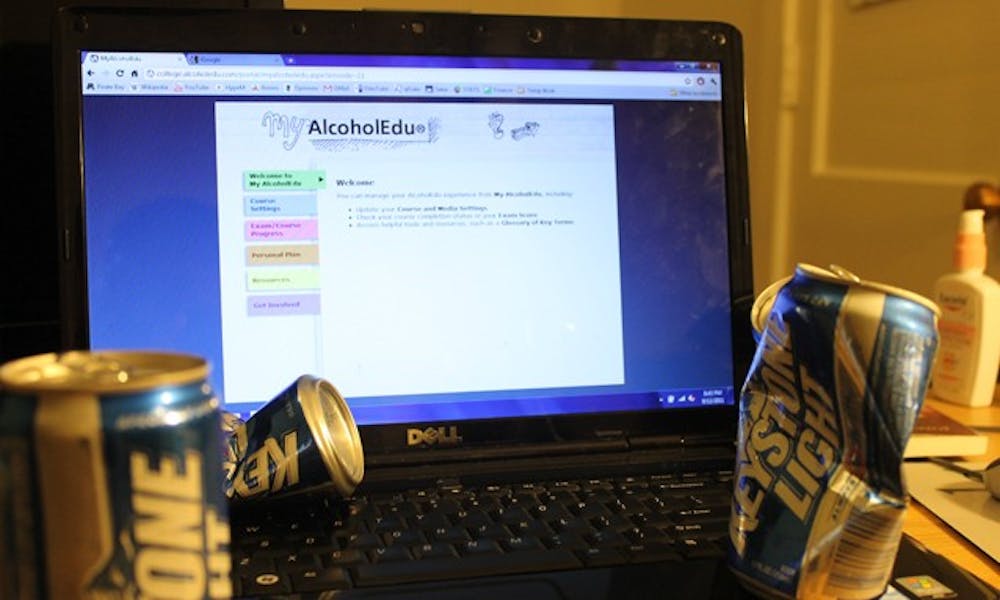A new study has found that AlcoholEdu does work, but by Spring, freshmen are back to their old drinking habits.
After completing the online alcohol education course AlcoholEdu for College, freshmen significantly reduced binge drinking during the Fall semester. But by the Spring semester, these effects had subsided, and students who had taken the course would drink at similar rates to those who had not, according to a July study published in the Journal of Studies on Alcohol and Drugs. The study observed 30 universities across the U.S., surveying students about their habits and decisions made while intoxicated.
Duke uses the two-part AlcoholEdu curriculum for incoming freshmen, as part of more than 500 campuses nationwide.
“No one would ever describe AlcoholEdu as a silver bullet, certainly, but I think the context is really the critical point,” said Brandon Busteed, Trinity ’99, founder and president of Outside the Classroom, the company that developed AlcoholEdu. “Although the headlines on this study tend to be ‘[AlcoholEdu] didn’t last past the first semester,’ the bigger news is that a nationally controlled study showed that it did last for a semester.”
He said the temporary effects of the study were to be expected, considering the brevity of the program.
“It’s only a two to a two-and-a-half hour program,” Busteed said. “For someone to actually think that a really brief intervention program is going to last for years and years is not a reasonable or realistic expectation.”
Tom Szigethy, associate dean and director of the Duke Student Wellness Center, similarly noted certain limitations in the format of AlcoholEdu.
“I think with any program like that, nothing is necessarily going to be a permanent fix unless people incorporate it into their own way of looking at life,” Szigethy said.
Despite the temporary nature of the program, Busteed emphasized the effectiveness of its timing.
“The majority of alcohol poisoning happens freshman year,” he said. “The fact that we were able to develop an effective intervention program before they arrive on campus for the riskiest semester is significant.”
Duke has used AlcoholEdu since the program’s creation 10 years ago, Szigethy said. However, he said he did not know whether the findings of the study were present on campus.
“We don’t have any campus-wide survey data that lands in the Spring semester,” he said. “So there’s really no way to say either way.”
Some students expressed skepticism about the effectiveness of the program.
“Realistically, I could see AlcoholEdu having a short-term effect at best,” freshman Anna Lamb said. “I learned whatever facts it told me for the first few days after I took that course online, but then I just forgot about it because it didn’t really leave a lasting impression.”
Freshman Sean Frith agreed with the study’s findings.
“I guess [AlcoholEdu] made me a little more aware of risky practices,” he said. “But I think by second semester people are going to dismiss what they learned and just form their own drinking practices.”
Busteed recommended supplementing his company’s curriculum with a number of different measures on campus to ensure responsible behavior past the first semester.
“Have a broader environmental campaign that includes stricter enforcement, clearer policies, working with local bars and restaurants to make sure they’re serving responsibly—a long list that includes legal and policy measures,” Busteed said.
The Duke Student Wellness Center has made efforts toward this “environmental campaign” at Duke.
“We developed the ‘Note to Self’ ad campaign about two years ago,” Szigethy said. “We also met with Shooters a couple years back to talk with them about different prevention strategies. And we’ve also reached out to businesses concerning the Durham Discount Card.”
The Durham TRY Discount Card, given to freshmen during orientation week, lists emergency numbers and the symptoms of alcohol poisoning and provides students with discounts at local vendors. Szigethy cited alcohol-free events during the Last Day of Classes celebrations, such as the Duke Chapel climb and the party monitor program, as other measures the Wellness Center has taken.
He said the Wellness Center plans to develop a new campaign to address common practices of pregaming before social gatherings.
“Students who encounter the negative consequences of drinking have typically been pregaming,” Szigethy said. “That’s usually the one commonality. We’re trying to get more information on the pregaming phenomenon so we can begin to explain its risk factors to students in the future.”
Busteed said he does not plan to make any specific changes to AlcoholEdu in light of the study’s new findings.
“We are always making tweaks and improvements,” he said. “But this study doesn’t alter anything we’re doing. It reinforces what we’re doing.”
Get The Chronicle straight to your inbox
Signup for our weekly newsletter. Cancel at any time.

